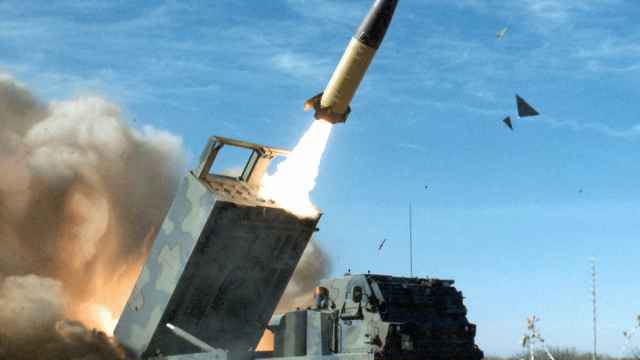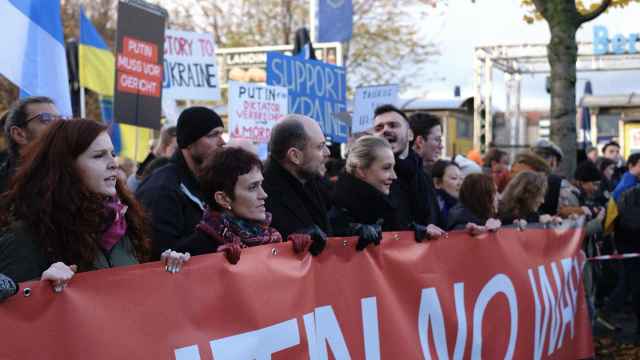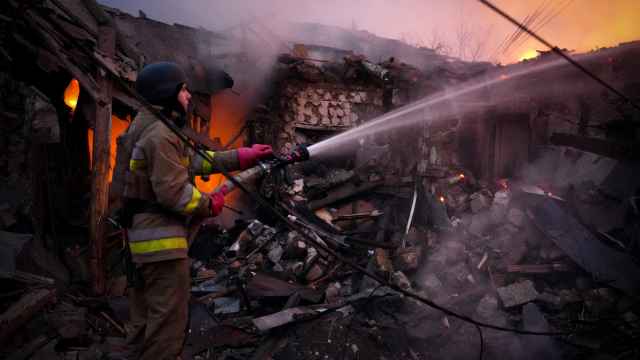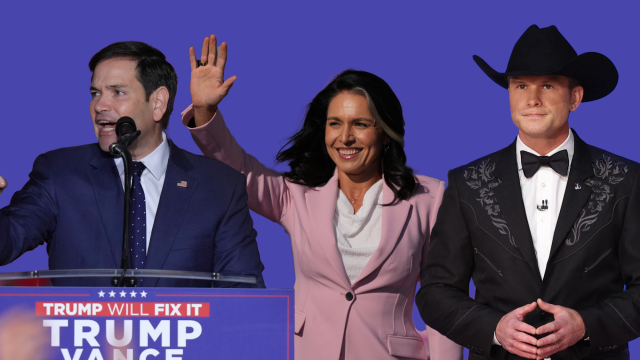SAMARA — Young and the old alike, most residents of Samara's rundown neighborhood of Zheleznodorozhny made no effort to conceal their support for Dmitry Azarov, a slick-looking 40-year-old who ran against the incumbent mayor, Viktor Tarkhov, in Sunday's elections.
“I don't care for what Tarkhov has been doing,” said German Prokopov, 62, a retired tractor driver, as he walked out of a polling station. "The garbage is still around my area, and nobody takes care of it."
“I voted for Azarov, we need younger people,” said Natalya, 45, a candy factory employee, who refused to give her last name. "The incumbent mayor was not doing anything for the city. He even destroyed the things that were built before he took office."
She said her teenage daughter, who accompanied her to the polls, also voted for Azarov.
The strong support for Azarov, an environmental official in the Samara regional government, is a feat because he ran as an opposition candidate despite being a member of the ruling United Russia party, which controls all regional capitals nationwide — except Samara, which voted for A Just Russia member and former businessman Tarkhov in 2006.
Azarov appeared headed for victory late Sunday night, according to early results. The outcome was predicted by most pundits interviewed by The Moscow Times, but it came after a campaign rife with fraud allegations and the removal of many mayoral candidates, some of whom, analysts said, had good chances of spoiling Azarov's bid.
Posters of Azarov, a bespectacled man in an elegant suit, far outnumbered those of Tarkhov in the streets of Samara in the days before the election. Most local media, including the weekly Samarskoye Obozreniye, controlled by the influential Volgapromgaz energy group, also fawned over Azarov, while his opponent was left with his back to the wall.
“We are in a strange situation: We are the authorities, yet we are in the opposition,” said Yelena Lebedinskaya, a campaign strategist for the 62-year-old Tarkhov, a seasoned politician who was a Yukos vice president at one point in his career.
She said ahead of Sunday's vote that the media attacked Tarkhov and local television, influenced or controlled by business groups close to United Russia or the party-dominated regional government, refused to give him coverage.
“They did have their own administrative resources, but it was incomparable to what the other side had,” Lyudmila Kuzmina, a Samara representative of the independent election watchdog Golos, said about Tarkhov's team.
Tarkhov did his best to capitalize on still-strong public discontent with United Russia in the city, even portraying his campaign as a military battle, down to campaign posters with the slogan, “The last line of defense.”
But analysts and Tarkhov's rivals alike said his apparent downfall had more to do with his inability to solve problems plaguing the city of 1.1 million people, known for its space industry and the Soviet-era Zhigulevskoye beer.
Despite minor achievements such as improving street lighting and providing new buses and trams, Tarkhov largely failed to improve the quality of Samara's poor roads, ease traffic congestion and modernize ramshackle infrastructure.
Tarkhov could not do much because his hands were tied, said Alexander Paulov, a prominent Samara lawyer and member of the Solidarity opposition group.
“He was burdened with obligations and couldn't act independently,” Paulov said.
“People voted for him in protest because they disliked the previous mayor, Georgy Limansky, but he turned out not to be the real master of the city,” he said.
Alexander Fetisov, a Samara businessman who ran for the Samara city legislature on the United Russia ticket on Sunday, accused Tarkhov of selling assets to businesses that supported him.
But a local independent political analyst, Dmitry Loboiko, said Azarov would likely do the same because he also has close ties to Samara business groups, especially Volgopromgaz, whose boss even lobbied for Azarov to be included into President Dmitry Medvedev's “staff reserve” of officials and businessmen.
Paulov said he disliked both candidates and chose to destroy his ballot — the only available means of protesting at an election after voting for “none of the above” was banned nationwide in 2006.
Some mayor hopefuls, in fact, entered the election campaign with a good chance to sweep the protest vote. One of those was Mikhail Matveyev, a Samara regional legislator not affiliated with any party and a long-time pen pal of the late writer Alexander Solzhenitsyn.
Matveyev, a historian who earned Solzhenitsyn's praise through his studies of self-rule in Russia, was called a potential “third force” in the Samara mayoral elections. But he spent the eve of the election instructing an assistant who ran for the city legislature after he was taken off the mayoral ballot along with more than 130 other candidates by election officials who cited various paperwork errors.
“I think the only reasonable thing to do is to get more independent people elected in order to not allow United Russia to get an absolute majority,” Matveyev told The Moscow Times.
Matveyev's opponents acknowledged that his participation spelled unnecessary trouble for the favorites.
“Allowing Matveyev to run was risky,” a senior United Russia official in the city said on condition of anonymity, citing the sensitivity of the issue.
“If Matveyev had run, there would have been a second round, but United Russia needed to win in the first round with an absolute majority,” said the analyst Loboiko, who helped Matveyev during his campaign.
About 5,000 supporters of rejected candidates rallied in the city to protest in late September, but to no avail.
Matveyev said Tarkhov himself did not put up much of a fight even though he and Azarov have a history of bad blood between them. The feud stems back to 2008 when Azarov — then the mayor's deputy — quit along with many other city government members, crippling City Hall.
Matveyev said the incumbent mayor probably obtained compromising information about Azarov while Azarov worked under him, but did not use it during the campaign.
Matveyev said Tarkhov was likely pressured into accepting his defeat early in the campaign. He cited as an example a threat from local prosecutor Rashid Badalov, who told the pro-Azarov Samarskoye Obozreniye magazine on the eve of the elections that he was ready to open an investigation into Tarkhov.
Azarov's allies said his victory might benefit the city by bringing in an increased inflow of federal cash, which would make Samara more attractive for investors.
In 2009, Forbes Russia magazine ranked Samara as the third-best Russian city in terms of business environment, but the city dropped to eighth place this year.
“Young professionals who love this city will come, and a more effective city economy will be built, using, among other things, resources from the federal center,” said businessman-turned-United Russia legislator Alexander Fetisov.
But Tarkhov's ouster may be a Pyrrhic victory for United Russia, which will now have to take responsibility for the city's well-being, the party's opponents said.
The regional authorities will lose the man “who is to blame for everything,” said Lebedinskaya of Tarkhov's office.
“Today, they have a common enemy. But how can they be angry at the mayor whom they elected?” she said of United Russia.
“Samara citizens have been told that they live in a very bad city. It will be interesting to see how soon after the election they are told the opposite,” Matveyev said.
His words were echoed by his ally Loboiko, who noted, “While slamming Tarkhov, they have also created distrust in the system.”
Svetlana Peunova, another mayoral candidate who was denied registration, said voters were left with no choice. “The choice between Tarkhov and Azarov is like a choice between the plague and cholera,” she said.
But Azarov may still be far from the worst option, said some political analysts, who described Peunova¹s unregistered party, Volya (Free Will), as a "cult."
When asked by a Moscow Times reporter for a cell phone number, Peunova, a former pianist-turned-faith healer, said she did not have one because she was afraid of being bugged by the secret services. She did not elaborate.
A Message from The Moscow Times:
Dear readers,
We are facing unprecedented challenges. Russia's Prosecutor General's Office has designated The Moscow Times as an "undesirable" organization, criminalizing our work and putting our staff at risk of prosecution. This follows our earlier unjust labeling as a "foreign agent."
These actions are direct attempts to silence independent journalism in Russia. The authorities claim our work "discredits the decisions of the Russian leadership." We see things differently: we strive to provide accurate, unbiased reporting on Russia.
We, the journalists of The Moscow Times, refuse to be silenced. But to continue our work, we need your help.
Your support, no matter how small, makes a world of difference. If you can, please support us monthly starting from just $2. It's quick to set up, and every contribution makes a significant impact.
By supporting The Moscow Times, you're defending open, independent journalism in the face of repression. Thank you for standing with us.
Remind me later.





